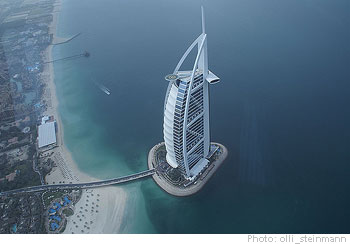 Presumably the rulers of Dubai and Abu Dhabi are currently locked in negotiations regarding the exact terms that will be attached to a “bailout” for Dubai World. We’ll never know the details but if, as seems likely, the final deal involves creditors taking some sort of hit (perhaps getting 75 cents in the dollar, at the end of the day), does that matter?
Presumably the rulers of Dubai and Abu Dhabi are currently locked in negotiations regarding the exact terms that will be attached to a “bailout” for Dubai World. We’ll never know the details but if, as seems likely, the final deal involves creditors taking some sort of hit (perhaps getting 75 cents in the dollar, at the end of the day), does that matter?
Dubai probably has around $100bn in total liabilities, if we include off-balance sheet transactions, so total credit losses of $30-50bn need to be assigned. The direct effects so far seem small. HSBC leads the pack, in terms of exposure, but our baseline estimate is a 3 percent loss relative to its equity – not good, but manageable (and the stock already fell 5 percent on the news). The impact among other financial institutions that lent to Dubai seems fairly spread out and mostly within continental Europe.
Korean construction companies and Ukrainian/Russian steelmakers are also affected by the likely fall off in construction activity, but the broader boom in emerging markets is unlikely to be disrupted. The repricing of risk so far does not apply significantly to East Asia or Latin America.
However, there is a worrying impact on Ireland.
The credit default swap spreads for Irish banks have widened signficantly — even relative to HSBC, with its direct Dubai involvement. In part, this is hedge funds betting that others will want to insure against the rising risk of an Irish default, but what’s the connection?
The thinking is that a partial bailout – with creditor losses – for Dubai from Abu Dhabi implies something about how Ireland will be treated within the European Union (and the same reasoning is also more vaguely in the air for Greece). This may make sense for three reasons.
- If Dubai can effectively default or reschedule its debts without disrupting the global economy, then others can do the same.
- If Abu Dhabi takes a tough line and doesn’t destabilize markets, others (e.g., the EU) will be tempted to do the same (i.e., for Ireland and Greece). “No more unconditional bailouts” is an appealing refrain in many capitals.
- If the US supports some creditor losses for Dubai (e.g., because of its connections with Iran), this makes it easier to impose losses on creditors elsewhere (even perhaps where IMF programs are in place, such as Eastern Europe).
The main effect will be to strengthen the hand of Ben Bernanke in Fed policymaking discussions – so US interest rates will stay low for a long while. If financial intermediaries draw the appropriate lessons from Dubai, Ireland, and Greece (and Iceland, the Baltics, Hungary, etc), they will be more careful about extending credit to places that are becoming overexuberant – even when it is cheap to increase debt levels.
But an outbreak of caution and care on the part of our biggest banks (and other investment managers) does not seem likely.
- Bulenox: Get 45% to 91% OFF ... Use Discount Code: UNO
- Risk Our Money Not Yours | Get 50% to 90% OFF ... Use Discount Code: MMBVBKSM
Disclaimer: This page contains affiliate links. If you choose to make a purchase after clicking a link, we may receive a commission at no additional cost to you. Thank you for your support!


Who didn’t see this coming? These people were building islands in the desert and driving gold plated cars. Now the banks are going to have to repossess all of these orphaned cars and homes (see: http://www.repofinder.com). Good luck to the banks who have to sell the gold plated cars.
Looks nice but man there prehistoric?
If you owe money to the bank in Dubai they freeze your account, stop your passport so you can’t leave and throw you in jail! FOR REAL!!! Does this mean that all the bankers in Dubai are going to jail?
Here’s something interesting I read…
http://ketiva.com/Arts_and_Humanities/dubai_world_postpones_payment_of_increasing_debt.html